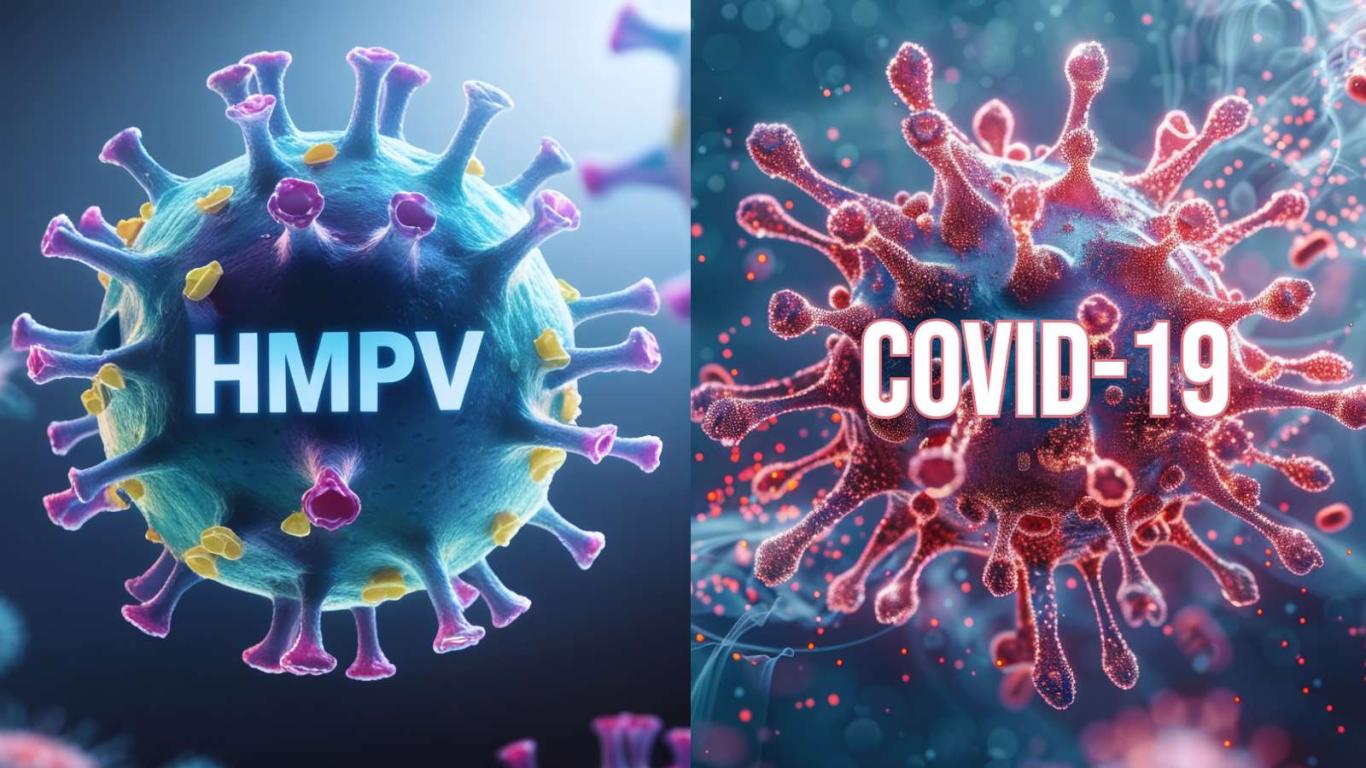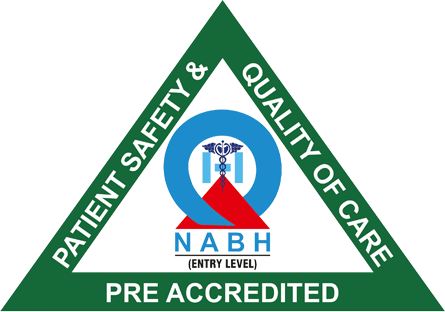Understanding Human Metapneumovirus (HMPV): Symptoms, Causes, Treatment, and Risk Factors

Respiratory illnesses are a growing health challenge worldwide, especially in countries like India, where air quality often falls far below safe levels. Among these illnesses is Human Metapneumovirus (HMPV), a lesser-known but potentially serious infection. While it doesn't get as much attention as the flu or COVID-19, HMPV can pose serious risks, particularly to young children, seniors, and individuals with chronic illnesses or weakened immune systems.
Knowing about HMPV is essential, not just for recognizing its symptoms but also for preventing its spread and protecting those most vulnerable. Whether you're a concerned parent, an older adult, or someone managing a long-term health condition, staying informed can make a big difference in protecting yourself and your loved ones.
In this article, we'll break down everything you need to know about HMPV, including its symptoms, causes, prevention, diagnosis, and treatment. Let's start by understanding what this virus is and how it affects us.
What is Human Metapneumovirus (HMPV)?
Human Metapneumovirus (HMPV) is a respiratory virus that was discovered in 2001 by Dutch scientists. It is part of the Paramyxoviridae family, which also includes other well-known respiratory viruses like respiratory syncytial virus (RSV) and parainfluenza viruses. HMPV mainly targets the respiratory system and can cause a range of illnesses, from mild cold-like symptoms to serious conditions like bronchitis and pneumonia.
Although HMPV can infect people of any age, it poses the highest risk to young children, older adults, and those with weakened immune systems or ongoing health issues. The virus tends to spread in seasonal patterns, with outbreaks commonly occurring in late winter and spring.
Is Human Metapneumovirus just a cold?
Human Metapneumovirus (HMPV) usually causes symptoms similar to the common cold, but in some cases, it can lead to more serious illness. The risk of severe symptoms is higher during a person's first HMPV infection, which is why young children are particularly vulnerable. After the initial infection, your body develops some immunity, making subsequent infections more likely to result in mild, cold-like symptoms. However, a study shows that adults over 65 and individuals with respiratory issues or weakened immune systems are also at risk for severe symptoms.
Is Human Metapneumovirus the Same as RSV?
Human Metapneumovirus (HMPV) shares similarities with Respiratory Syncytial Virus (RSV), as both belong to the same family of viruses called Pneumovirus. While they are not identical, they can lead to similar symptoms. HMPV tends to cause the most severe illness in babies aged 6 to 12 months, whereas RSV is more likely to lead to serious health issues in infants younger than 6 months.
Rising Concern: The HMPV Outbreak in China
The first reported outbreak of Human Metapneumovirus (HMPV) in China was a pivotal moment in recognizing the significance of this respiratory virus. Although HMPV has been present worldwide, its spread in China brought it into the spotlight due to the virus's rapid transmission and widespread impact. This outbreak underscored how HMPV could severely affect both children and older adults, prompting greater attention to the need for early detection, preventive measures, and effective strategies to control its spread.
Rising Threat of HMPV in India: What You Need to Know
Human Metapneumovirus (HMPV) is emerging as a growing health concern in India, with a noticeable rise in cases in recent years. The virus has drawn attention due to its significant impact on vulnerable groups, including young children, elderly individuals, and those with weakened immune systems. This increasing trend has led healthcare authorities and professionals to prioritize raising awareness, ensuring early diagnosis, and promoting preventive strategies to curb its spread and minimize the risk of severe complications.
The Symptoms and Causes of Human Metapneumovirus (HMPV)
Symptoms of Human Metapneumovirus (HMPV)
The symptoms of HMPV vary depending on factors like age, overall health, and immune system strength. While the virus often causes mild symptoms in healthy individuals, it can lead to severe respiratory issues in vulnerable groups, such as young children, elderly adults, and those with weakened immune systems.
Mild Symptoms
In healthy individuals, HMPV typically resembles a common cold. These symptoms include:
- Runny Nose: Persistent nasal congestion or discharge, often one of the earliest signs.
- Cough: A dry cough that may worsen over time.
- Sore Throat: Scratchiness or pain, especially noticeable when swallowing.
- Fatigue: Persistent tiredness and low energy levels.
- Low-Grade Fever: A slight rise in body temperature, sometimes accompanied by chills.
Severe Symptoms
In at-risk groups, HMPV can progress to affect the lower respiratory tract, causing more serious conditions, such as:
- Wheezing: A whistling sound while breathing, indicating airway narrowing.
- Shortness of Breath: Difficulty breathing, especially during physical activity or while resting.
- High Fever: A significant and persistent rise in temperature that may need medical attention.
- Chest Pain or Tightness: Discomfort or pressure in the chest due to respiratory distress.
- Complications: Severe cases can lead to conditions like pneumonia, bronchiolitis, or acute respiratory distress, which may become life-threatening without prompt care.
Symptoms in Infants and Young Children
Infants and children are particularly susceptible to HMPV. Symptoms in this group often include:
- Difficulty Feeding: Poor appetite or trouble swallowing.
- Irritability: Increased fussiness, crying, or restlessness.
- Rapid Breathing: Fast, shallow breaths, sometimes with flaring nostrils or grunting.
Symptoms in Immunocompromised Individuals
For individuals with weakened immune systems, such as those undergoing cancer treatment or living with chronic illnesses, HMPV can quickly escalate. Symptoms may mimic those of severe respiratory infections and often require hospitalization for management and care.
By recognizing these symptoms early, timely medical intervention can help prevent severe complications and improve outcomes.
Causes of Human Metapneumovirus (HMPV)
HMPV is caused by a virus from the Paramyxoviridae family, primarily affecting the respiratory system. The infection leads to inflammation and irritation of the airways. While the virus itself is the main cause of the illness, its spread is influenced by various external factors and modes of transmission.
How Does Human Metapneumovirus Spread?
HMPV spreads through direct contact with an infected person or by touching surfaces contaminated with the virus. Some common ways it can be transmitted include:
- Coughing and sneezing.
- Shaking hands, hugging, or kissing.
- Touching objects or surfaces like phones, door handles, keyboards, or toys.
Who is at Risk for Human Metapneumovirus?
Anyone can contract HMPV, but certain groups are at a higher risk of experiencing severe illness. These include:
- Children under 5 years old (especially premature infants) or adults over 65.
- Individuals with weakened immune systems due to conditions like HIV, cancer, autoimmune disorders, or medications that suppress the immune system.
- People with respiratory conditions such as asthma or COPD.
How Is Human Metapneumovirus Diagnosed?
Healthcare providers typically diagnose HMPV by reviewing your symptoms and medical history. They may use a soft swab to take a sample from your nose or throat, which is then tested in a lab for viruses and other infections. It's important to note that HMPV testing is usually only done if you have severe symptoms.
In some cases, your doctor may also recommend a bronchoscopy or chest X-rays to check for any changes or issues in your lungs and airways.
Treatment Options for Human Metapneumovirus (HMPV)
There are no specific antiviral medications for treating human metapneumovirus. Most people can manage the symptoms at home until they recover.
However, if you or your child are seriously ill, hospitalization may be required. In the hospital, doctors can closely monitor your condition and help prevent complications. Possible treatments may include:
- Oxygen therapy: If you're struggling to breathe, extra oxygen may be provided through a tube in your nose or a mask over your face.
- IV fluids: Fluids given through an IV can help keep you hydrated.
- Corticosteroids: These steroids may reduce inflammation and help ease some of your symptoms.
Is It Possible to Prevent a Human Metapneumovirus Infection?
Although there is no vaccine or specific treatment for Human Metapneumovirus (HMPV), taking preventive measures can significantly reduce the risk of infection and help stop its spread. These actions are especially important to protect those who are most vulnerable.
- Practice Good Hand Hygiene: Wash your hands regularly with soap and water for at least 20 seconds, especially after touching common surfaces or being in public places. If soap isn't available, use an alcohol-based hand sanitiser, and avoid touching your face with unwashed hands.
- Disinfect Frequently-Touched Surfaces: Clean and disinfect high-touch areas like doorknobs, phones, and countertops to remove any virus particles that may remain.
- Follow Proper Respiratory Hygiene: Cover your mouth and nose with a tissue or your elbow when coughing or sneezing, and throw tissues away immediately. Wearing a mask when you're unwell can also help prevent spreading the virus to others.
- Avoid Close Contact with Sick Individuals: Stay away from people showing symptoms of respiratory illness. If someone in your household is sick, minimize shared spaces and items, and consider wearing a mask while caring for them.
- Boost Your Immune System: Strengthen your immune system by eating a balanced diet, staying active, getting enough sleep, and managing stress. A healthier immune system can help fight off infections more effectively.
- Stay Informed and Seek Prompt Medical Care: Recognize early signs of HMPV and isolate yourself if you feel unwell to avoid spreading the virus. If your symptoms worsen, seek medical advice, particularly if you belong to a higher-risk group.
Final Note By Baluni Hospital
Human Metapneumovirus (HMPV) is a serious respiratory virus that requires increased awareness, especially as it can lead to severe illness in vulnerable individuals. Understanding the symptoms, causes, and preventive measures is key to safeguarding your health and those around you. If you or a loved one experience persistent respiratory symptoms, seeking prompt medical attention is crucial. At Baluni Hospital, we are dedicated to providing compassionate care and expert treatment designed to meet your unique health needs. Visit us for a thorough diagnosis and treatment, ensuring your well-being every step of the way.







